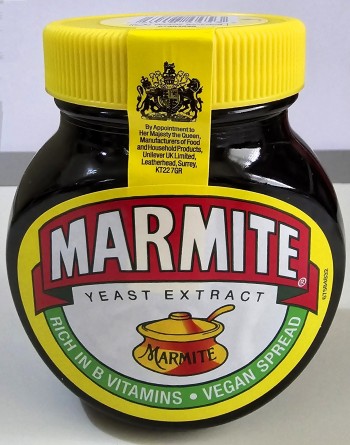Manufactured in Britain since 1902, Marmite is a savoury paste made from concentrated yeast and vegetable extract, used as a spread and for enriching soups and stews.

In British English, because Marmite has a distinctive flavour which divides opinions, the name Marmite occurs in similative or allusive use, with reference to someone or something that polarises opinions by provoking either strongly positive or strongly negative reactions, rather than indifference.
—Cf. a British use of ‘Marmite’ (divisiveness).
But the name Marmite also occurs in the following two British-English phrases:
– to spread [something or someone] like Marmite, and variants, with reference to the fact that Marmite can be used as a spread;
– like Marmite, a little goes a long way, and variants, with reference to the fact that Marmite is made from a concentrated extract.
The earliest occurrences that I have found of the phrase to spread [something or someone] like Marmite, and variants, are as follows, in chronological order:
1-: From Brooke Spenser’s column, published in The Journal (Newcastle-upon-Tyne, Northumberland, England) of Thursday 27th August 1964 [No. 36,782, page 4, column 1]:
This idea came as one of the Fringe benefits provided by the Cambridge Footlights revue, which is on in Edinburgh at the moment.
Last night the four students, who are the natural successors to Jonathan Miller and Peter Cook, brought the house down with a skit on the Whitehall Planning Department.
They were determined to spread the population of England more evenly over the country—“like Marmite.”
2-: From Hedge of the world, by Julian Barnes, published in The Guardian (London and Manchester, England) of Saturday 26th October 1991 [Weekend Guardian: page 7, column 1]—Adrian Fisher was the chief executive of Minotaur Designs, a firm which built mazes:
Leeds Castle in Kent, offers the tourist (as of 1988) a split-level extravaganza with surprise grotto and underground exit tunnel; Fisher explains that this maze is deliberately placed quite some distance from the castle, so that customers can be “spread around like Marmite”.
3-: From a review of Life’s Grandeur: The Spread of Excellence from Plato to Darwin (London: Jonathan Cape Ltd, 1996), by Stephen Jay Gould—review by Tim Radford, published in The Guardian (London and Manchester, England) of Thursday 7th November 1996 [The Guardian 2: page 9, column 1]:
Life is driven by microbes and there could be so many of them, deep under the planet’s surface, that if you could spread them evenly with a knife, like Marmite, they would sit five feet thick over the entire land surface of the planet.
The earliest occurrences that I have found of the phrase like Marmite, a little goes a long way, and variants, are as follows, in chronological order:
1-: From Teachers will strike at 600 schools, by Richard Bourne, education correspondent, published in The Guardian (Manchester, Lancashire, England) of Tuesday 6th January 1970 [page 1, column 3]—NAS stands for National Association of Schoolmasters:
The NAS has plans for rotating one-week strikes in those areas where it is strongest. Yesterday Mr Terence Casey, its general secretary, said: “Militancy is like ‘Marmite.’ A little goes a long way.” After the one-week strike in Wales, the NAS will call out members in Manchester the following week.
2-: From Mr Cape’s basement and Mr Wilson’s stable, an extract from Shadows on the Grass (London: Victor Gollancz Ltd, 1977), by the British author John Middleton Murry Jr. (1926-2002), published under the name of Colin Middleton Murry—extract published in The Bookseller (London, England) of Saturday 27th August 1977 [No. 3,740, page 1,686, column 2]:
“Mr. Wilson, you can employ me.”
“Oh-h-h, so you want a job, do you? Well, what can you do?”
I told him I had just finished preparing a book catalogue and that previously I had worked at Jonathan Cape’s. Like Marmite I made a little go a long way, and, in the words of the immortal Dr. Fagan did not hesitate to “temper discretion with deceit”.
He heard me out and then he laughed. “Well, it just so happens that I could use someone to do some cataloguing.”
3-: From a review of The Heart Has Its Reasons, broadcast on Channel 4—review by Nancy Banks-Smith, published in The Guardian (London and Manchester, England) of Friday 22nd February 1991 [page 37, column 8]:
A cardio-thoracic surgeon described an occupational hazard of the practice of medicine, the hardened heart. […]
It was quite a night for medicine and a little medicine, like Marmite, goes quite a long way.
4-: From Last night’s TV, by Nancy Banks-Smith, published in The Guardian (London and Manchester, England) of Thursday 18th March 1999 [The Guardian 2: page 19, column 1]:
The stench of the lower classes
When Princess Diana died, Kensington Park was flooded with flowers. To go there was to be one drop of water carried along in a river of people. The only way to go was the way that quiet river was flowing. A year later, a permanent flower garden was proposed to mirror this phenomenon.
Diana’s Neighbours (Modern Times, BBC2), elderly Kensington residents, contested it implacably and successfully, though her butler explained it would all be in the best possible taste. “The man who saw to the washing of the princess’s knickers,” as Brian Sewell, the art critic, called him. A little Sewell, like Marmite, goes a long way and there was quite a lot of Sewell here.
5-: In Canadian English—From the column Pleasures of the Table, by Pam Freir, published in the Times Colonist (Victoria, British Columbia, Canada) of Wednesday 7th November 2007 [page C1, column 4]:
Sweet onion concentrate, I decided, is a bit like Marmite. The smallest midge goes a long, long way.
—Cf. also the Australian-English phrase happy little Vegemite, designating a contented person. (Vegemite is a type of savoury spread made from yeast and vegetable extract.)
